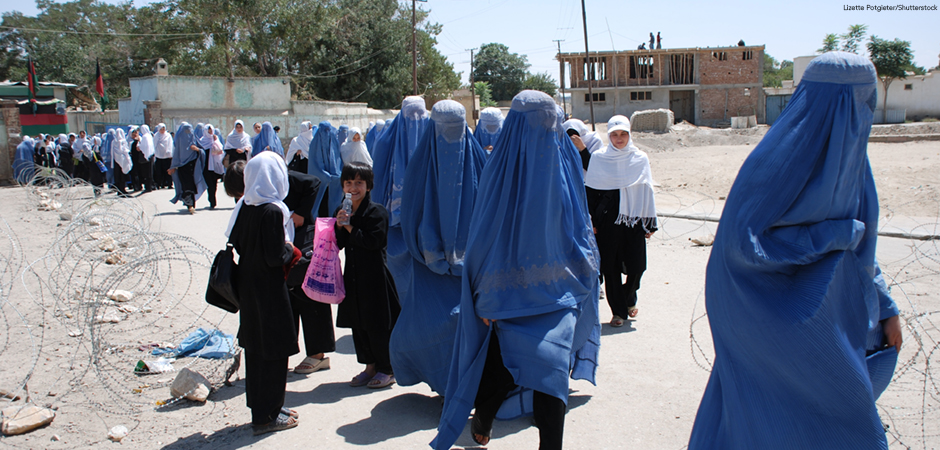
Women in Afghanistan no longer have a voice or a public presence. In the two years since the Taliban seized control in Afghanistan, women’s rights have been disappearing. The Taliban is a fundamentalist group that follows a strict conservative and religious set of Islamic principles. It has banned girls from attending school beyond the sixth grade. It has barred women from attending college, going to parks or gyms, traveling without a male escort, and holding a job. Women also must cover themselves from head to toe when they leave home. Representatives of the United Nations Human Rights Council issued a public statement that these rules essentially trap women in their homes.
Afghanistan’s Women’s Rights History
In 1919, women were granted the right to vote. That was one year before white women in the United States gained the same right. Since then, the rights of women in modern Afghanistan have been affected by policies that have swung between moving forward (progressive) and moving backward (regressive).
In 1979, the Soviet Union invaded Afghanistan and introduced social reforms such as required education for girls. When the Taliban took control of the government in 1996, it eliminated women’s rights. After the September 11, 2001, terrorist attacks the United States and its allies invaded Afghanistan. They put a U.S.-backed government in place. For the next 20 years, girls and women advanced in areas such as education, employment, and health care. New laws were added to the Afghan constitution to protect women.
The Taliban in Control
In the summer of 2021, the U.S. government withdrew its military from Afghanistan. In mid-August, the Taliban took control of the capital city, Kabul. The new government promised to uphold women’s rights. But by December 2021, the Taliban had restored many of its earlier restrictions on women and girls. It also revoked the 2004 Constitution that had strengthened women’s rights.
The Taliban has also added new controls, such as banning women from working in nongovernmental organizations (NGOs). NGOs are usually voluntary groups that have a social mission and operate without government control. They help others by providing aid such as food, water, shelter, and health care, or by working to solve social and economic problems. Before the ban, women made up 30-45 percent of employees in international NGOs and 50-55 percent in national NGOs. In April 2023, the Taliban specifically banned Afghan women from working for the United Nations (UN), an international NGO.
Women and Girls Suffer
The Taliban has also closed all beauty salons in the country. That has impacted 60,000 employees–women whose jobs were crucial to supporting their families. The salons provided a safe, public space away from men and a break from the mental pressure and anxiety of life under Taliban rule. These restrictions and economic hardships have created a severe mental health toll on women and girls. Reports of depression and suicide are widespread, especially among teenage girls. Rates of domestic violence and forced marriage of girls continue to rise. Afghan women say they feel invisible and isolated–like living in prison. They are finding it more difficult to get health care since under the Taliban’s rules, women can only receive medical care from other women. Female medical students have not been able to finish their studies because of the ban on higher education for women. As a result, there are not enough female doctors and other medical professionals.
The Taliban has claimed some of these restrictions are temporary because some women have not followed the strict dress code or the rules that separate men and women. They claim women are allowed to work in certain jobs if they are following Islamic values. Taliban spokespersons say there are women working in many areas of society, including health, education, police departments, airports, and other businesses. However, experts say that is simply not true.
International Judgment
The international community has condemned the Taliban’s treatment of women and girls. Amnesty International and the International Commission of Jurists (ICJ) call it a war against women. And the UN has said that under the Taliban, Afghanistan has become the most repressive, or restrictive, country in the world in terms of women’s rights. Afghans say women, their contributions, their opinions, their voices, and their thoughts are being erased from society.
According to the UN, more than 1.6 million Afghans have fled the country in the last two years. Some of them are young women who have been able to get out and continue their educations in other countries. They say they will never forget the women they left behind.
